 Jim McLean severed his links with Dundee United in spectacular style. Ken Gall reflects on the fall of a hero who became an embarrassment
Jim McLean severed his links with Dundee United in spectacular style. Ken Gall reflects on the fall of a hero who became an embarrassment
In a recent poll, the Great British Public selected the Apollo moon landing as television’s greatest moment, with the funeral of the Princess of Wales, the fall of the Berlin Wall and the release from prison of Nelson Mandela listed among other cherished memories of our time.
Tragically, had this poll been commissioned just a week later, the sensational televised downfall of Dundee United chairman Jim McLean would surely have been a prime candidate for inclusion. After all, who needs royal weddings and the like when one can enjoy the on-screen drama seen in McLean’s uproarious post-match encounter with the BBC’s John Barnes?
For those unfortunates who may have missed the story, this was the background. McLean, the prime figure in the history of Dundee United – managing the club to its one Scottish championship in 1983 and to the UEFA Cup final in 1987 – was now chairman. The club was going through a period of lamentable results, culminating in a 4-0 home defeat by Hearts that left United languishing at the foot of the Scottish Premier League with two points out of a possible 33. Some 400 United fans – traditionally apathetic in the face of such reverses – had gathered at the main entrance at Tannadice to call for the heads of McLean and the board.
Fatefully, McLean then agreed to be interviewed on camera by a BBC journalist, John Barnes. The opening seconds of the encounter provided little evidence of the excitement to come; a fairly cursory interview with the chairman of a struggling team, one might have thought. Alas, Barnes then made his mistake; a loose question concerning the future of manager Alex Smith (who himself had been appointed only in August, following the resignation of Paul Sturrock) left him open to a fearsome counter-attack.
The pressure that had been building up within the notoriously non-phlegmatic McLean during United’s abysmal 2000-01 season (following as it did the shambolic 1999-2000 and the dreadful 1998-99) suddenly, and terrifyingly, burst. Raging at the question (and prompting the liberal use of the BBC’s foul language bleeper) McLean demanded that it be cut and moved off-camera. An alleged incident followed and McLean has since been charged with assault.
Unsurprisingly, the repercussions were almost instant. Once the steam had stopped escaping from his ears, McLean realised the enormity of his actions and – to his credit – resigned as chairman and as a director. For its part, the SFA made little effort to hide the fact that it was considering a life ban from football for McLean.
Those who had heard nothing of McLean before the incident reacted with a mixture of incredulity and hysterical laughter; for fans of Dundee United, however, there was only the weary resignation and embarrassment usually exhibited by friends of Michael Barrymore at television awards ceremonies. This is by no means the first time his name has been mentioned in connection with allegations of physical confrontations, intimidation and foul language, though none had ever threatened his career. Now McLean’s time was up.
The contrast with Kevin Keegan’s dramatic post-match interview following the England v Germany tie was marked. While Keegan favoured the quivering lip and stoic style pioneered by the likes of Dame Sybil Thorndike, McLean’s performance was pure George Raft: an air of menace; a touchy response to a seemingly innocuous inquiry; then his eyes narrowed – and the questioning stopped.
It is worth recalling for a moment that, at one time, Jim McLean and Alex Ferguson were club managers of equivalent stature and achievement and that both were touted for jobs at numerous big clubs. But while Ferguson always seemed to have his eyes on the bigger prize, McLean seemed content to settle for the small-town, and increasingly small-time, ambiance of Dundee United.
For the fans’ pressure group United for Change – long-term campaigners for McLean’s removal – a dream result had been achieved in a manner no one could have believed possible. The news that he was to sell his 40 per cent shareholding and sever all ties with the club was greeted with initial delight by many, fading to a strange sense of disappointment among long-time fans.
The reason was simple; the club’s greatest-ever manager had become a widely despised chairman, selecting a succession of incompetent managers (including his own brother) who made a series of staggering signings – Tony Mols, Joachim Ferraz, Alex Mathie, Jan Telesnikov – and sold Billy Dodds for a pittance. A club that had come to regard the top four in Scotland as its natural domain had slipped to a point where relegation seemed a near certainty and where it was struggling to compete even with once-derided neighbours Dundee.
Sadly, all the goodwill built up by McLean following the league title win, the two League Cups and the triumphs over Barcelona, Monaco, PSV and many others had faded years ago, and those who once lauded him had become desperate to see him go. There is a certain cruelty in the fact that Jim McLean – a man who simply did not know how or when to let go – will be remembered as much for 20 seconds of televised madness as for nearly 20 years of managerial success.
From WSC 166 December 2000. What was happening this month